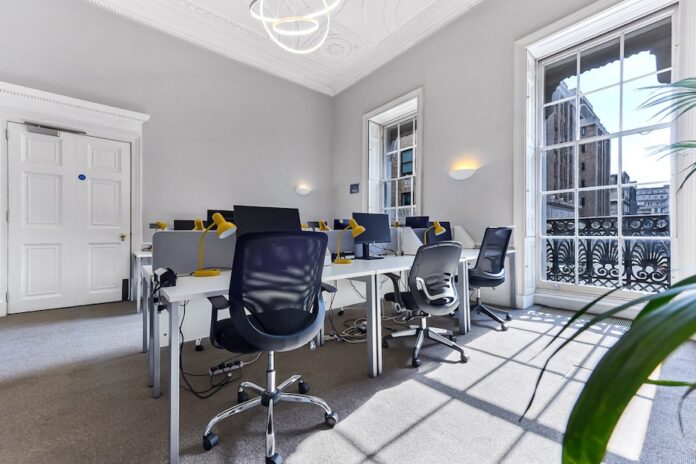You’ve got a growing team. You’re hiring fast, new clients are coming in, and your current setup is bursting at the seams. There’s excitement, but with that comes the pressure. You need more space to grow.
Choosing the right flexible office space to lease in London could be one of the biggest financial decisions you’ll make this year. Get it right, and you’ll give your team room to grow, breathe, and perform. But get it wrong, and you’ll bleed money on terms you didn’t understand.
This guide gives you the practical facts that landlords might not tell you upfront. You’ll know what to ask before you sign, what hidden fees to spot, and how to make sure your new space supports your business plans instead of limiting them.
Why So Many Growing Teams Are Turning to Flexible Office Space
A flexible office space is a type of workspace that allows businesses to rent office areas on short-term, adaptable agreements rather than traditional long leases. It offers ready-to-use offices, shared amenities, and the freedom to scale up or down as team sizes or needs change. These spaces often include desks, meeting rooms, and essential facilities within one all-inclusive price, removing the hassle of maintenance or long commitments.
There are three main reasons why flexible office spaces are ideal for startups, remote teams, and growing companies:
- Cost Control: Traditional office leases often force you to commit to more space than you need, tying up cash in empty desks and unused areas. With flexible offices, you only pay for what your team actually uses. The pricing is usually all-inclusive, covering utilities, cleaning, and furniture, so you can plan your monthly budget without worrying about hidden expenses or maintenance bills.
- Adaptability: Growth can be unpredictable. Flexible leases make it easy to adjust your workspace to match your reality. You can move from a 10-person suite to a 25-person space in the same building, or downsize during quieter periods, without facing the penalties or disruption of breaking a traditional lease.
- Speed: Timing matters when your business is expanding. Traditional leases can drag on for months with legal reviews, fit-outs, and compliance checks. Flexible office providers handle all of that upfront. You can sign a short agreement, move in within days, and start working immediately in a fully equipped environment. That means no downtime or lost productivity.
Together, these benefits make flexible office spaces the smarter, faster, and more practical choice for growing startups.
If you need a flexible office space to lease in London quickly, you can reach out to commercial property experts like Tupelo Spaces. Having an expert on your side ensures your best interests are protected and you don’t fall victim to common pitfalls.
Before You Sign Anything, Understand These Lease Terms
When you’re looking at flexible office space to lease in London, the paperwork may look simple at first. Short contracts, inclusive prices, and a fast move-in. But buried in the details are clauses that can cost you thousands later.
1. Lease Length and Exit Clauses
Ask how long you’re locked in. Some “flexible” offices still demand a 12-month commitment disguised as a license. Find out:
- Can you exit early without heavy penalties?
- How much notice do you need to give?
- Is there a renewal clause that triggers automatically?
2. Deposit and Upfront Costs
Most spaces ask for a security deposit, but the amount varies widely. Some require one month’s rent, others want three. Make sure you know if it’s refundable and how long it takes to get it back.
3. Hidden Fees
Many leases claim to be “all-inclusive,” but here’s what’s often missing:
- Meeting room bookings charged by the hour
- Printing and storage fees
- Cleaning or maintenance surcharges
- Mail handling costs
Always request a written breakdown before signing.
Space, Layout, and Fit-Out: What You See Isn’t Always What You Get
A glossy office tour can make any space feel perfect. But once your team moves in, you might find that the layout doesn’t work.
When evaluating the right flexible office space to lease in London, look at how adaptable the space truly is. Ask questions like:
- Can you move walls or add private offices later?
- Are you allowed to bring your own furniture or branding?
- What happens if you want to reconfigure the layout?
Many operators have rules that limit what you can change. If your brand matters, find out how much control you have over the look and feel of your workspace.
Location is a Factor You Must Never Ignore
Choosing the wrong location can affect everything from staff productivity to hiring potential.
Consider:
- Commute times: Can your team get there easily by Tube, train, or bus?
- Client access: Is the office convenient for meetings?
- Local amenities: Are there cafes, gyms, and lunch spots nearby?
According to research from Office Freedom, flexible office prices vary drastically by area. A desk in the West End might cost twice as much as one in Shoreditch. So before committing, it’s wise to compare prices across at least three London zones that fit your team’s lifestyle and budget.
Understanding the Cost Breakdown
| Cost Component | What’s Usually Included | What Might Be Extra |
| Rent | Desk, basic utilities | Meeting rooms, storage |
| Service Charges | Cleaning, maintenance | Weekend access, repairs |
| Facilities | Wi-Fi, coffee, kitchen use | Printing, lockers |
| Admin Fees | Reception services | Mail handling, security passes |
Average flexible office prices in London range from £400–£900 per desk per month depending on the location and amenities. Always check if that rate includes VAT.
A Look into Amenities and Their Real Value
Amenities can make or break your team’s experience. Don’t get distracted by fancy extras that sound impressive but add little real value. Instead, prioritise the essentials:
- Strong internet and power reliability
- Comfortable meeting spaces
- On-site support and maintenance
- Clean, functional facilities
Ask the operator if they provide backup power for outages, on-site IT assistance, and whether maintenance requests are handled same-day. These details determine how productive your team can actually be.
Reputation of the Operator Matters More Than You Think
Not all office providers are great. Some maintain their buildings perfectly. Others cut corners once you’ve signed the agreement.
So before you commit to any flexible office space in London, you want to research the provider’s history. Look for:
- Online reviews and tenant feedback (if available)
- Building maintenance standards
- Transparency on billing and lease renewals
Ask current tenants about their experience. If the operator hesitates to connect you with references, that’s a red flag.
Confirm Your Freedom of Scaling Up or Down
The biggest reason to choose flexible office space is to grow without the stress of relocation. But flexibility only works if the provider supports your next move.
Ask these questions before you sign:
- Can we upgrade to a larger suite in the same building?
- Are there sister properties within your network if we expand?
- What notice period is needed to make a change?
Some operators offer “move within network” programs that let you scale easily. Others treat every move as a new contract. Make sure you know which one you’re dealing with.
Common Mistakes to Avoid When Leasing in London
Even smart companies fall into traps when rushing to secure space. Here are the top errors to avoid:
- Not reading the fine print. Short-term doesn’t always mean flexible.
- Ignoring exit costs. Early termination can trigger fees, so always confirm this.
- Overestimating space needs. Start smaller, then expand as needed.
- Failing to compare districts. A small commute difference can double your rent.
- Signing without negotiation. Even flexible leases have room for better terms.
Take the time to ask questions and get every promise in writing. You can also consult with a commercial property expert to ensure you’re not going in blindly.
Case Study
A London fintech company once signed a 12-month license for 30 desks in Clerkenwell. They were told they could “upgrade anytime.” It felt great.
But three months later, they needed 20 more seats. The operator’s larger office was full, and the break clause required six months’ notice. And that was how they ended up paying for extra desks in a second location across town.
That one oversight cost them more than £25,000 over six months.
This is why understanding the small print before signing matters.
Checklist to Review Before Signing
Keep this list handy when evaluating flexible office Spaces to lease in London:
- Contract length and exit terms
- Total cost (rent plus all extras)
- Deposit and refund policy
- Branding and layout flexibility
- Infrastructure and backup systems
- Building management and tenant support
- Ability to scale up or down quickly
- Renewal and notice periods
Tick off each item before committing. It’s far cheaper to ask questions now than to fix mistakes later.
The Bottom Line: Sign Smart, Not Fast
The most successful growing teams in London treat their lease like a business deal, so they negotiate the best terms.
Take your time. Read every clause. Ask questions. And most importantly, make sure the office you choose matches your team’s future, not just your present.
Better still, you can partner with a London commercial property expert like Tupelo Spaces to make the process easier. Our specialists handle the search, negotiations, and legal checks so you can move into the right office at the right price. We work across London, helping teams of every size find space that fits their budget and future plans.
If you want your best interests protected and mistakes avoided, get in touch now.

